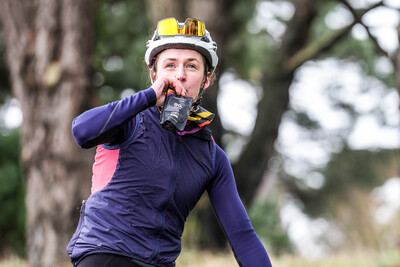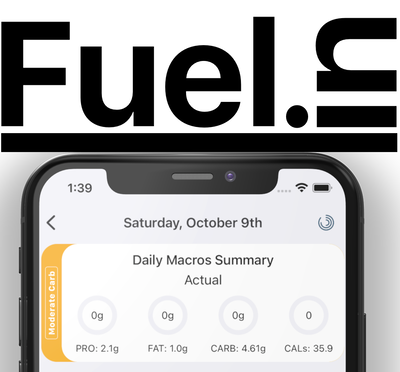Much of our education and tools focus on how athletes should fuel during training and races. But how should you approach your day-to-day nutrition in order to maintain your health and performance?
Fuelin co-founder Scott Tindal is the former Head of Performance Nutrition for NHL outfit Toronto Maple Leafs and the current Performance Nutritionist to numerous elite and age-group triathletes, so he's well positioned to explain how much carbohydrate you should be consuming on a daily basis...
Hi Scott, first up, there’s a big focus on the three macronutrients that endurance athletes consume. Is there a hierarchy of importance when it comes to carbohydrate, protein and fat?
First and foremost, I think the focus should be on the foods that contain these macronutrients. It's important for the athlete to educate themselves on where these macros come from and then begin to understand how to consume the correct amounts as part of their daily nutritional intake.
What I'm regularly seeing is athletes thinking about the macros like single entities and not realising that foods will almost always contain the three macros of protein, fat and carbs (some exceptions do exist of course).
The intake of these three macros on a daily basis through food is not the same as a targeted approach for getting a specific macro such as carbohydrates into the athlete for race fueling purposes. In a race fueling case, it's unlikely to be a food first approach but rather a specific supplement such as a carb gel.

The single importance of any one macro being better than the other is a stupid notion. The purpose of athletes and what they're wanting to achieve is going to dictate the importance of the macro and it shouldn't be viewed in a binary approach.
An integrative approach around the purpose of the macro being used is far better in my mind. As an example, if you're wanting to fuel for race purposes then the relative amounts of carbs are going to go up and the choice of those carbs is going to change to simple forms of carbs with minimal fibre content. The total intake of fat is going to drop and the protein amount might drop slightly to assist the gut function.
Whereas on a day-to-day basis when you're not focusing on a race-type training session or race, then the choice of carbohydrates would be better focused on lower glycemic, higher fibre type foods to fuel the health of the athlete. Protein would be higher to support recovery, satiety (feeling of fullness), and muscle function and fat would be adjusted to meet caloric needs and to assist hormonal function along with satiety.
On the subject of fats, we've seen something of a low-carb, high-fat revolution. What's your take on these LCHF diets?
I personally believe that revolution is ending. Again, it was built on a binary approach that LCHF is the way forward for endurance athletes. This was based on cherry picking from scientific papers along with anecdotal evidence of certain athletes. A lot of it was taken out of context and like most things, taken to extremes.
The notion of using a higher fat or lower carb nutrition approach at certain parts in a training plan (day, week or month) does have some merits, yet should not replace the need for higher carbohydrate fueling when it's required.
When the research is reviewed, it's clear that as intensity and duration of a session increases, the reliance on carbs becomes increasingly prevalent. If you want to go fast, you need to be using carbohydrates.
If you want to be using carbohydrates in racing, you need to practice using them in training. This requirement is from a practical standpoint in terms of tolerance and physically managing that amount of carb, as well as a physiological standpoint to improve gastric emptying, carb transporter amounts in the intestine, and overall carbohydrate oxidation rates through repeated exposure.

We focus a lot on how much carbohydrate athletes should consume during training and races. But what are the recommendations for carb intake in an athlete’s day-to-day diet?
For me, an important part of a nutrition program focused on race performance is helping athletes understand how they practically hit targets like 60-90g of carb per hour during training, and how they monitor their progress with increased carb intakes over time.
So, educating a triathlete on carbohydrate supplements to trial and test for the bike and run is critical to success.
The day-to-day amounts of carbs is going to vary based on the training volume of the athlete combined with the intensity (overall load) of the week and how that compares to the previous week.
The goal of the athlete from a weight loss perspective versus a performance based goal would impact that amount of carbohydrate too.
From a lower end of the spectrum, I'd be saying 2g per kg of bodyweight and for high-end fueling you would be looking at 8g/kg/bw. The types of carbs being consumed would also be dictated by the intensity, volume and timings of training.
What are the basic ways in which you work out and structure an athlete’s carbohydrate needs for their day-to-day diet?
At Fuelin, we use a traffic light system that reflects 'lower (not low)', 'moderate' and 'higher' amounts of carbs required per meal and as an overarching view of the day.
This amount is based on the athlete's target bodyweight, hours of training in the current week vs. the previous week, training intensity and duration of individual sessions, and training session type. All of this is managed in the Fuelin app by syncing directly with the athletes Training Peaks or Todays Plan account created for them by their coach.
The individual's dietary preference of mainstream, vegetarian, vegan and pescatarian are accounted for, along with dietary allergies and intolerances. The system syncs with LoseIt and MyFitnessPal to deduct the macronutrients consumed from the macronutrient targets set out in the app.

I imagine there can be a difficult balance to be struck when endurance athletes are attempting to fuel adequately to support high levels of training but carb manipulation is a known way of managing bodyweight too. How do you strike a successful balance?
Great question! Breaking the program down into two-week sprints is one way we have been working with athletes and coaches of late. This allows the athletes to then prioritise weight loss or high end performance as their primary goal. The benefit of this is that it gets their mindset in the right place.
All too often, we see athletes wanting to lose weight yet also trying to smash an FTP out of the park. It isn’t impossible, but it's far easier to achieve the singular when planned appropriately with the coach.
And finally, what are the common mistakes you see athletes make when periodising carbohydrates?
The most common mistake that we see is the lack of understanding about carbohydrates. They are portrayed as the “devil” yet this is mainly due to social media scaremongering as opposed to what the science is actually saying.
This lack of understanding then translates into the athlete not fully understanding the importance of practicing carbohydrate fueling in race pace training sessions. This lack of training with carbohydrates can have many negative consequences for the athlete, including increased gastrointestinal distress, inability to practically manage the act of carb fueling, and potentially underfueling their race.